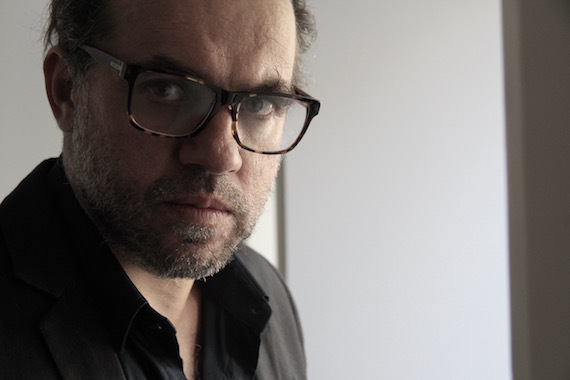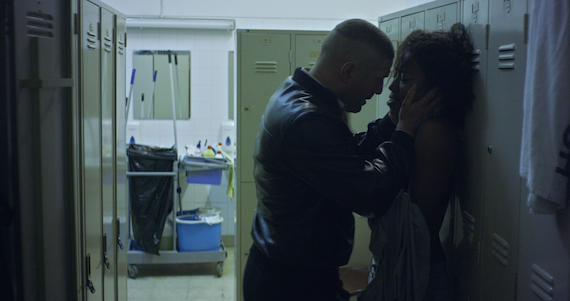I'll admit it, the Portuguese film São Jorge by Marco Martins was briefly called "the other boxing movie" by me in Venice.
But after a spellbinding two hours spent in the company of Martins' beautiful film, starring Nuno Lopes and Mariana Nunes, São Jorge will hereafter only be known as a masterpiece, to yours truly. A cinematic feast that, with little fanfare and a lot of heart, keeps the viewer glued to his or her chair for just under two hours.
Filmed in gritty tones by DoP Carlos Lopes, around the parts of Lisbon that are definitely not on any tourist map, São Jorge tells a story of desperation and the heroism that arises when man is faced with a fight or flight situation.
Jorge is an ex-boxer, a casualty of the European troika bailout measures imposed on his country. He has a Brazilian ex-wife, Susana, who wants little to do with him. Not because she doesn't love him or the spark is no longer there -- as we obviously realize halfway through the film -- but because she herself is making choices based on need, not want. Jorge and Susana have a child, Nelson, and to his father, the child is a form of salvation. So when Susana threatens to go back to Brazil and take Nelson with her, something snaps in Jorge, and his life takes a turn for the worse. Or does it?
Beauty, they say, lies in the eyes of the beholder, and I believe the ending of a film can be gifted to its audience by a caring director. It was clear from the moment I met filmmaker Marco Martins that his respect for the audience is what makes his films so wonderfully haunting.
I feel lucky to have caught up with him in Venice, where São Jorge premiered in the Orizzonti section of the La Biennale del Cinema, the Venice Film Festival. And to make my bounty even more plentiful, I also had the honor to speak with the sultry, kind Nuno Lopes and the stunning and intelligent Mariana Nunes.
When I'm at a festival, forced to watch a lot of films, at some point I feel like I begin to blank out. Yet your film held me spellbound for the entire two hours. I wanted to know what would happen to Jorge, I took that journey with him, Susana, and their child. How do you make a film that appeals so much, with so little Hollywood flash?
Marco Martins: When I thought about the movie and about the character Jorge, the first image that came to my mind was the first sequence of the film, where he's running away to get some money and he doesn't stop. And there I thought of the character of Jorge as a body, more than a mind. In a strange way, sometimes when I was writing he was like an action hero, because he's just actions, not thinking. The main characteristic of this character is that he's completely manipulated by all the surroundings and all the people around him. Not Susana, she's being sincere with him. When she says something it's not to manipulate him. He's very naive.
Even the son, no, to some extent manipulates him?
Martins: But the son is more of the conscience as a character.
Mariana, how difficult was it to become this woman -- Susana?
Mariana Nunes: A lot, because she lives in a very hard situation. She has no way to live, she has no more work, she has no hope. She had a husband, Jorge but they are not together and she is married with another man that she doesn't love. But she's trying, trying to stay alive. I didn't know about all these things that happened in Portugal, I'm from Basilia, and now I live in Rio, in Brazil. I know all this history because of them. And once I knew about the film, I started to go into the character, but not just the character -- the situation. And then I came to Lisbon to the rehearsals and stayed there for three months, living in Portugal. When I arrived things were better, but in the place where Susana lives things are not so good. People are very poor there.
Jorge is of course the name of the main character but can you talk a bit about the meaning of Saint Jorge for the Portuguese?
Martins: Saint Jorge is an important saint for the city of Lisbon, and he's a warrior -- São Jorge. When I thought about the title of the film and the character, initially I didn't think about São Jorge, I just call him Jorge. One day, I live in the center of Lisbon near the castle of Sao Jorge, and I was coming home, and I asked myself who is Sao Jorge? You live there of course you never research it, so then I researched it and found out he was a warrior, and the prayer of Saint George was a great metaphor for the film. So it became very evident this was the name. You know, also boxers always have some kind of superstition. With this guy, I liked the fact that he had some spiritual thing, that takes him away from the environment where he lives because those around him are not very spiritual. They are very attached to money.
When you're from a middle class upbringing it's easy to say "they're always talking about money" but when you don't have any, and you struggle to live day by day, it's all you talk about!
Martins: And also rich people talk a lot about money. When money becomes an issue, a real important issue in your life, you talk a lot about it. I think if you have a job and a stable life you don't talk about it too much, because you have the same amount of money, month after month.
It's good you talked about money, because there is a certain violence and it's very aggressive when you show money in a film. Americans do that a lot, they have guns and they have money in films. Suitcase of money, people exchanging money. For us, I never thought of showing money in films but then I thought I want to make a movie where I show money. Not guns. But there's money, and it's one of the main subjects in the film.
I look at your today, Nuno and you're as different as can be from Jorge: your hair has grown back, you sport a beautiful smile, and you're a lot slimmer... How do you connect to such a character, to his silence and all that?
Nuno Lopes: We did all the research from the beginning together [with Martins] and I spent a lot of time training for the boxing. I started working with the boxers two years before we shot and in the last six months trained six hours a day. Then I spent a lot of time with the people in the neighborhood and when you spend a lot of time with people there is something that stays with you, and your subconscious. Like if you stay in a town with a strong accent, if you're open to it, after three or four months you start talking like that. So I spent a lot of time with them, trying to absorb those kinds of things and get into the language which is very different from mine. And the conditions and the thoughts... And I think something came from that and the rest was just thinking about the material, the script and what we wanted to talk about. That drove me through the character. We did it together from the beginning so it's the first film I did where I don't feel there was a moment when I started acting. The acting was just the part of the construction of the film.
When you first read the script Mariana, what made you connect with Susana?
Nunes: Many things, first of all because she's Brazilian like me, she is a black woman, and I've lived in Europe, in Madrid and know how is the racism there. Brazil is a very racist but it's different here, because people are less mixed, things are more separated. And I had a mother-in-law that thought things very similar to Jorge's father. I understand what Susana lives.
Marco, there is no real violence in the film, and yet it was described in the synopsis as Jorge being dragged into a life of crime. This was your choice and I think that's what kept me watching until the end, knowing that the violence wasn't going to make me jump out of my seat. How do you write a script like this?
Martins: When I write a script I don't want to have a moral judgement about the characters. I want to like every character, I cannot write a character that I don't like. If I do that, I'm making a moral judgement, I'm judging instead of the viewer. The moral decisions have to be made by the audience. The director shows the subject and he manipulates it a lot, but the moral questions have to be important, and be open. And I like characters that until the end you keep guessing what they are going to do. Jorge never explains himself. To anyone. Someone said that a good script is when someone is reading it, and they think they know what is going to happen next and they find out it's different, slightly changed. Not making the obvious decision makes the script more erotic in a way.
Marco, when did you know you had to have them both, Mariana and Nuno, in your film?
Martins: With Nuno, we started working together from the beginning, and we did work a lot of times in the last years in theater, in previous films, so I knew. With Mariana, I didn't know her but I was looking for a black Brazilian actress and a good friend of mine, Brazilian, told me I had to look at Mariana. I was like, I'll see her. Then we went to Brazil, me and Nuno and we cast for a while and then I think that they were perfect together. Their chemistry is perfect. And that's very important. Even in the festival photo shoot, here, they are still the perfect couple. If you look at them in the movie, you believe immediately that they are a couple.
Was there a particular scene, Marco that you had to cut, and which you wish was still there?
Martins: Since it was very documentary-style as well, a mix of fiction and documentary, we shot a lot of things that are not in the movie. The film could easily have half an hour more.
But that's the secret of a great filmmaker, that he can cut a piece of his child for the sake of his audience not getting bored.
Martins: That's true, when I'm in the editing room, I always respect the viewer. I try to be a viewer. It's the ideal artist, to be both the viewer and the creator, that's impossible but it's what you always try to do.
I think a lot of filmmakers don't think like that. You find there are always those ten minutes that they could have left on the editing floor, and the film would have been better.
Martins: Even now if I see it, I think it could have been a little less. The editing for me is always a long process, I edited this film for six months.
A film like yours is one that allows for a conversation to make the world a better place. Do you all think cinema is a way for us to understand and change the world?
Nunes: Maybe. Maybe it can work. I don't know. I think São Jorge is very universal because the situation is in Portugal but it's not only there. In Brazil people will connect with the movie, and in other places maybe.
Martins: Some subjects it's impossible for them to be well explained in the news, because we don't have the time or the space, or the media doesn't care for it. Sometimes fiction is very important, it's something that people forget. I could not make a documentary about this subject, you have to make a fiction -- a fiction about an impossible documentary.
Lopes: It's definitely a way to change, but it depends on the viewer, actually. We just put questions and give space to thought, but then it's for the viewer to think about it. That part we cannot change.
Martins: The fact that people sit in a movie theater for two hours, it's a lot in today's world. People just see news on their phone, or they heard about the crisis but there are no faces of the crisis, just numbers. If they sit two hours, they have to think about it for two hours...
Lopes: That's why I love this kind of political films, that in a way are not consensual, because when you leave and think, "I agree with them all the time," you go home and you sleep very well and never think about it again. But if it confronts you with another vision, hopefully it will make you think about it. I think the way of changing something is to not make the audience agree with you.
Images courtesy of La Biennale, used with permission.



